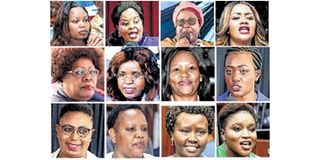Gender rule still elusive at top echelons of power

Women Cabinet Secretaries, Principal Secretaries and Chief Administrative secretaries.
What you need to know:
- Women currently occupy 34 top positions in different ministries as Cabinet Secretaries, PS or CAS.
- Only 14 out of 50 Chief Administrative Secretaries are women, translating into 28pc.
Top appointive positions in government ministries have remained under men’s grip, with the number of women falling below the minimum one-third mark.
A detailed analysis by Nation.Africa indicates that women currently occupy 34 top positions in the ministries – seven Cabinet Secretaries, 13 Principal Secretaries and 14 Chief Administrative Secretaries – out of the available 123.
Even after President William Ruto formally appointed 50 Chief Administrative Secretary (CAS), who took the oath of office yesterday, men still disproportionately have the lion’s share.
President Ruto appointed 14 women – 28 per cent – to CAS positions, the number falling short by at least three to meet the one-third minimum constitutional requirement.
Those who assumed their new roles as CAS include: former nominated Senator Millicent Omanga (Interior and National Administration ministry); Bishop Margaret Wanjiru, who unsuccessfully ran for Nairobi senator (Cooperatives and SMEs); Ann Wanjiku Mwangi (Office of the Deputy President); and Rehema Hassan (Office of the Prime Cabinet Secretary).
Former Laikipia Woman Rep Catherine Waruguru took up a CAS slot at the Ministry of Foreign and Diaspora Affairs. Her former West Pokot counterpart Lilian Cheptoo is among the assistant ministers in the Ministry of Trade and Investments.
Eighty-six women – 35 per cent – were among 240 candidates that the Public Service Commission (PSC) shortlisted for CAS positions. Only 14 made it to the final list. A total of 1,709 women applied.
A rights activist had challenged the CAS list, alleging that 27 slots were illegal nominees. Mr Eliud Karanja Matindi, in the petition filed at the High Court in Milimani, said the PSC had allowed the creation of only 23 offices, not 50. The case had not been concluded, despite the latest development.
Of the 187 women who made it to the PS shortlist, only 13 were picked by Dr Ruto, against 38 men. The PSs were sworn in last December. The women include Ms Teresia Malokwe (Devolution), Ms Esther Ngero (Performance and Delivery Management), Ms Aurelia Rono (Parliamentary Affairs Department), Ms Caroline Nyawira Murage (Correctional Services Department), Ms Roseline Njogu (Diaspora Affairs), Ms Veronica Mueni Nduva (Gender and Affirmative Action), Dr Josephine Mburu (Health standards and Professional Management), Ms Esther Thaara Muhoria (TVET) and Ms Beatrice Inyangala (Higher Education and Research).
The others are Ms Susan Mangeni (MSMEs Development), Ms Sylvia Naseya Muhoro (Wildlife), Ms Ummy Mohammed Bashir (Culture and Heritage) and Ms Betsy Muthoni Njagi (Blue Economy and Fisheries).
The women CSs controlling 31 per cent of the ministries are Ms Alice Wahome (Water), Ms Aisha Jumwa (Gender), Ms Rebecca Miano (EAC, Asals), Ms Soipan Tuya (Environment), Ms Susan Wafula (Health), Ms Peninah Malonza (Tourism) and Ms Florence Bore (Labour and Social Protection).
In some ministries, men have occupied all the top positions of CS, PS and CAS, pushing women to the periphery. For instance, the Ministry of Information, Communication and the Digital Economy, led by CS Eliud Owalo, is like a boys’ club as men head all its departments.
The Department for Broadcasting and Telecommunications is headed by Prof Edward Kisiangani as the PS, while the Department of ICT and the Digital Economy fall under Mr John Kipchumba Tanui. The CAS nominees headed for the ministry are Mr Denis Itumbi and Mr Simon Mwangi Kamau.
Two months before the August 9, 2022 General Election, Dr Ruto pledged to allocate 50 per cent of his administration to women. He also promised to initiate the process of actualising the elusive two-thirds gender rule within the first three months of his administration.
Dr Ruto also promised that his administration would provide access to government procurement opportunities to ensure all women automatically qualify for funding.
Article 81 of the Constitution says not more than two-thirds of the members of elective and appointive public bodies should be of the same gender.
During a consultative forum with women leaders on the Constitutional Amendment Bill, National Assembly Majority leader Kimani Ichung'wah said the nation is poorer because of the failure to implement the two-thirds gender rule.





